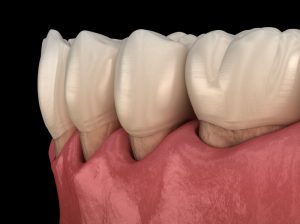 Unfortunately, gum disease (sometimes called periodontal disease) is much, much more common than you might think. The CDC has found that almost half of Americans are suffering from periodontitis, an advanced and potentially dangerous condition that, if left alone, can easily result in tooth loss. Knowledge is the key to protecting your smile; take the first step by learning the answers to these 4 periodontal disease FAQs.
Unfortunately, gum disease (sometimes called periodontal disease) is much, much more common than you might think. The CDC has found that almost half of Americans are suffering from periodontitis, an advanced and potentially dangerous condition that, if left alone, can easily result in tooth loss. Knowledge is the key to protecting your smile; take the first step by learning the answers to these 4 periodontal disease FAQs.
1. How Do I Know If I Have Gum Disease?
There are two main stages of gum disease: gingivitis and periodontitis. Early gingivitis will make your gums red and tender. They’ll also bleed easily, which you might notice while flossing or eating crunchy foods.
Periodontitis is much more severe compared to gingivitis. Pockets will form where the teeth are attached to the gums, and you might notice some pus leaking out from time to time. Other symptoms include loose teeth, frequent mouth sores, and a foul taste. Eventually, you might lose your teeth altogether.
Remember, it’s easier to treat gum disease early on, so if you notice signs of gingivitis, don’t wait for it to become periodontitis; see your dentist in Glenpool right away!
2. Can Gum Disease Cause a Heart Attack?
There are many studies showing that patients with gum disease are more likely to suffer from heart attacks and other cardiovascular issues. While it’s not clear whether one directly causes the other (many of the risk factors for periodontal disease are also tied to heart problems), many researchers believe that bacteria in your mouth can lead to inflammation and infection in other parts of the body, including the heart and important arteries.
Gum infections have similarly been linked to Alzheimer’s, lung disease and liver cancer.
3. What Causes Gum Disease?
Your lifestyle can be the deciding factor for your oral health. Poor dental hygiene can cause plaque and tartar to build up, making it more likely that bacteria will enter the gums. Smoking is also a prime culprit in many oral infections.
That said, there are some circumstances you won’t be able to control that increase the risk of periodontal disease. For example, diabetes and your own DNA can leave you more vulnerable to infections in general.
4. How is Gum Disease Treated?
The kind of gum disease therapy you need depends on the stage it’s in. Mild gingivitis can sometimes be reversed by taking better care of your mouth; that means brushing, flossing and seeing the dentist regularly. Periodontitis, on the other hand, will usually require a deep cleaning to remove tartar and bacteria that’s above and below the gum line; afterwards, the roots of the teeth will be smoothed to help them reattach to the gum tissue while making it harder for bacteria to reattach.
If you have other questions about gum disease or have any concerns, make an appointment with your dentist as soon as possible. When it comes to protecting your smile, your first and best line of defense will always be prevention!
About the Author
Dr. Parnam Mohanna learned about dentistry from the bottom up, starting his career as a dental technician when he was 16. He has since completed extensive advanced training and education courses and has over 26 years of experience. At his practice, Complete Cosmetic Care Dentistry, he provides periodontal therapy to treat gingivitis and advanced periodontitis alike. To schedule an appointment, visit his website or call (918) 216-1000.
